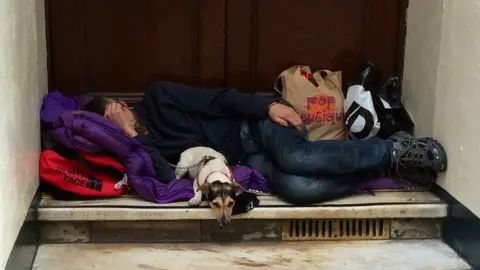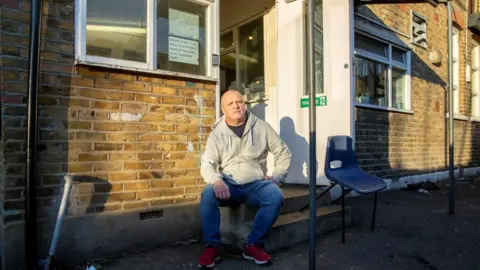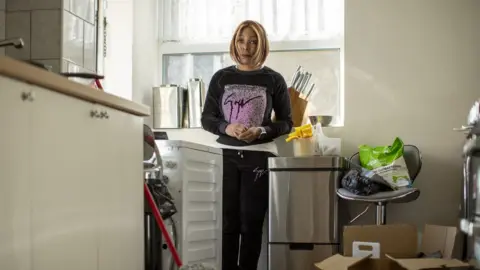Shelter fears homelessness could surge now Covid protections have ended
 BBC
BBCThe number of homeless people could surge this winter because protections put in place amid Covid have ended, it is warned.
Research by charity Shelter suggests more than 274,000 people are currently homeless in England.
Outside of London, Luton in Bedfordshire has the highest rates of homelessness, the figures showed.
The government said tackling homelessness was an "absolute priority".
Shelter found there were 126,000 children among the figure.
The government's Everyone In scheme was launched in March 2020 and has provided more than 37,000 rough sleepers with a place to stay during the pandemic.
The charity says now Covid protection schemes have finished, it has been flooded with calls.
In London, one in 53 people is now homeless and in Luton it is one in 66 people, the charity says.
Including rough sleepers and people living in temporary accommodation, figures show one in every 206 people in England do not have a home.
Outside of London, the 10 places with the highest rate of homelessness alongside Luton were: Brighton and Hove; Manchester; Milton Keynes; Birmingham; Harlow; Epsom and Ewell; Basildon; Dartford and Hastings.
Shelter's chief executive Polly Neate said: "We predicted the pandemic would trigger a rising tide of evictions and our services are starting to see the reality of this now.
"We're flooded with calls from families and people of all ages who are homeless or on the verge of losing their home."
The end of Covid protections such as the 'Everyone In' scheme, eviction ban and a universal credit boost, alongside winter pressures and rising living costs, could mean thousands more vulnerable people are at risk, the charity says.

'I want to try and make it as normal as possible'
 Alexandra Smart/Shelter
Alexandra Smart/ShelterTomasz and his family have been living in the shed in the garden of an emergency hostel in Ilford since an eviction in August.
Despite working long hours as a maintenance worker, Tomasz has been priced out of private renting.
He said: "This Christmas I'm telling the kids that Santa will still be able to find them. I'm trying to make it better by putting up a small Christmas tree on the shelf and a Christmas light in the window.
"I want to try and make it as normal as possible but it's so stressful and depressing."

'I'm stuck between a rock and hard place'
 Shelter/Alexandra Smart
Shelter/Alexandra SmartAyeasha, 43, from South London, and her family have been homeless for eight years and are moving to their fourth temporary accommodation.
She has been signed off work as a carer because of anxiety and depression and worries about the effect being homeless is having on her children, including her youngest who has now been homeless for most of his life.
She said: "Being uprooted on a regular basis has been awful. To begin with there were four of us living in one room, sharing a bathroom and kitchen with others. That was quite disturbing for the children."
Her last accommodation made her feel unsafe and the next one has issues with cold and damp but she feels stuck .
"It's not the greatest, but I guess nowhere is going to be the greatest, I'm stuck between a rock and hard place."

Shelter's figures show that 2,700 people are sleeping rough on any given night, with nearly 15,000 single people in direct access hostels and nearly 250,000 people living in temporary accommodation - most of whom are families.
Polly Neate continued: "It is shameful that 274,000 people are without a home, and with Covid protections now gone thousands more will be joining them. A shoddy hostel room or a freezing cold doorway is no place to wake up on Christmas morning, but sadly so many people will."
A Department for Levelling Up, Housing and Communities spokesman said: "Tackling homelessness is an absolute priority for this Government which is why we have committed more than £2bn in funding over the next three years.
"On top of that we're providing £375m this year to prevent homelessness and have given councils in England £65m to support people in rent arrears."
